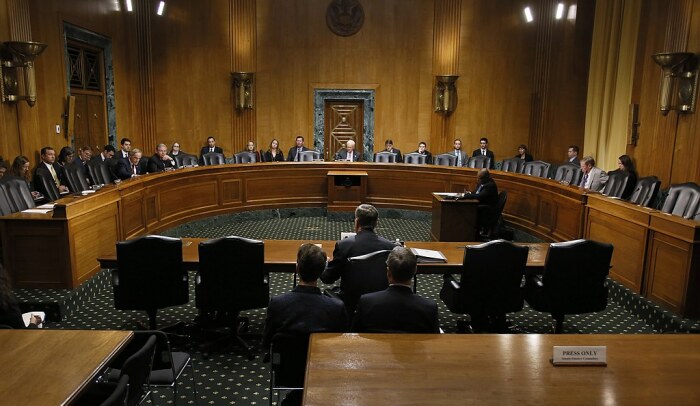Carl Olsen sent the letter enclosed below to the U.S. Senate Finance Committee. -promoted by Laura Belin
Cannabis_Reform@finance.senate.gov
Cannabis Administration and Opportunity Act
GAI21675 4LN Discussion Draft S.L.C.
Modern state, national, and international drug laws were designed to be flexible. Instead of statutory classification of drugs, classification is an administrative process called scheduling. The scheduling of drugs can be adjusted by administrative processes without the need for further legislation or renegotiated international treaties.
International Scheduling
Cannabis was recently rescheduled internationally by the UN Commission on Narcotic Drugs, removing it from the most restrictive schedule of the 1961 Single Convention on Narcotic Drugs.
Administrative Regulation
There is an exemption for non-drug use of peyote, 21 C.F.R. § 1307.31, created by administrative regulation in 1966 and carried over under the Controlled Substance Act of 1970. 54 Fed. Reg. 4679 (1966); 21 C.F.R. § 166.3(c)(3) (1968).
Statutory Exception
Congress has placed restrictions on US Department of Justice from interfering with state medical cannabis laws since 2015, but this barely scratches the surface. Consolidated and Further Continuing Appropriations Act, 2015 (H.R. 83), Public Law 113-235, § 538, 128 Stat. 2129, 2217 (Dec. 16, 2014); Consolidated Appropriations Act, 2016 (H.R. 2029), Public Law 114-113, § 542, 129 Stat. 2241, 2332 (Dec. 18, 2015); Consolidated Appropriations Act, 2017 (H.R. 244), Public Law 115-31, § 537, 131 Stat. 135, 228 (May 5, 2017); Consolidated Appropriations Act, 2018 (H.R. 1625), Public Law 115-141, § 538, 132 Stat. 347, 444 (Mar. 23, 2018); Consolidated Appropriations Act, 2019 (H.J. Res. 31), Public Law 116-6, § 537, 133 Stat. 13, 138 (Feb. 15, 2019); Consolidated Appropriations Act, 2020 (H.R. 1158), Public Law 116-93, § 531, 133 Stat. 2317, 2431 (Dec. 20, 2019); Consolidated Appropriations Act, 2021 (H.R. 133), Public Law 116-260, § 531, H.R. 133 (Dec. 27, 2020); Commerce, Justice, Science, and Related Agencies Appropriations Act, 2022 (H.R. 4505), § 531.
Federal Discrimination
Medical cannabis users still face federal discrimination in many other ways, as articulated by Justice Thomas in Standing Akimbo v. United States, No. 20-645 (June 28, 2021).
https://www.supremecourt.gov/opinions/20pdf/20-645_9p6b.pdf
Taxes – 26 U.S.C. § 280E (2019)
No deduction or credit shall be allowed for any amount paid or incurred during the taxable year in carrying on any trade or business if such trade or business (or the activities which comprise such trade or business) consists of trafficking in controlled substances (within the meaning of schedule I and II of the Controlled Substances Act) which is prohibited by Federal law or the law of any State in which such trade or business is conducted.
Banking – 18 U.S.C. § 1956 (2019)
any act or acts constituting a continuing criminal enterprise, as that term is defined in section 408 of the Controlled Substances Act (21 U.S.C. 848)
Racketeering – 18 U.S.C. § 1961 (2019)
felonious manufacture, importation, receiving, concealment, buying, selling, or otherwise dealing in a controlled substance or listed chemical (as defined in section 102 of the Controlled Substances Act)
Drug Free Workplace – 41 U.S.C. § 8101 (2019)
The term “criminal drug statute” means a criminal statute involving manufacture, distribution, dispensation, use, or possession of a controlled substance
Conflict Resolution
An administrative exemption for medical cannabis, like the exemption created for peyote in 21 C.F.R. § 1307.31, would resolve these conflicts while remaining consistent with U.S. treaty obligations. The international treaties all have exceptions for domestic law and constitutional limitations (federalism in the United States). Single Convention on Narcotic Drugs of 1961, Article 36 (“Subject to constitutional limitations of a Party, its legal system and domestic law”); Convention on Psychotropic Substances of 1971, Article 22 (“Subject to constitutional limitations of a Party, its legal system and domestic law”); Convention against Illicit Traffic in Narcotic Drugs and Psychotropic Substances 1988, Article 3 (“Subject to its constitutional principles”). State sovereignty is a fundamental constitutional principle in the United States.
An administrative exemption for medical cannabis, like the exemption for peyote, would provide Congress with time it needs to craft a more permanent statutory resolution and provide much needed relief immediately.
A total of 47 states and several federal territories have now authorized the use of cannabis for medical purposes.
https://www.ncsl.org/research/health/state-medical-marijuana-laws.aspx
Please ask the DEA to make an exemption for state authorized medical use of cannabis like the one it currently maintains for the non-drug use of peyote. State authorized medical use of cannabis is not drug abuse. Gonzales v. Oregon, 546 U.S. 243 (2006).
Thank you!
July 29, 2021
Carl Olsen
130 NE Aurora Ave
Des Moines, IA 50313-3654
515-343-9933
carl@carl-olsen.com
https://www.iowamedicalmarijuana.org/
https://carl-olsen.com/
Top photo of a U.S. Senate Finance Committee meeting from 2016 available via Wikimedia Commons.

